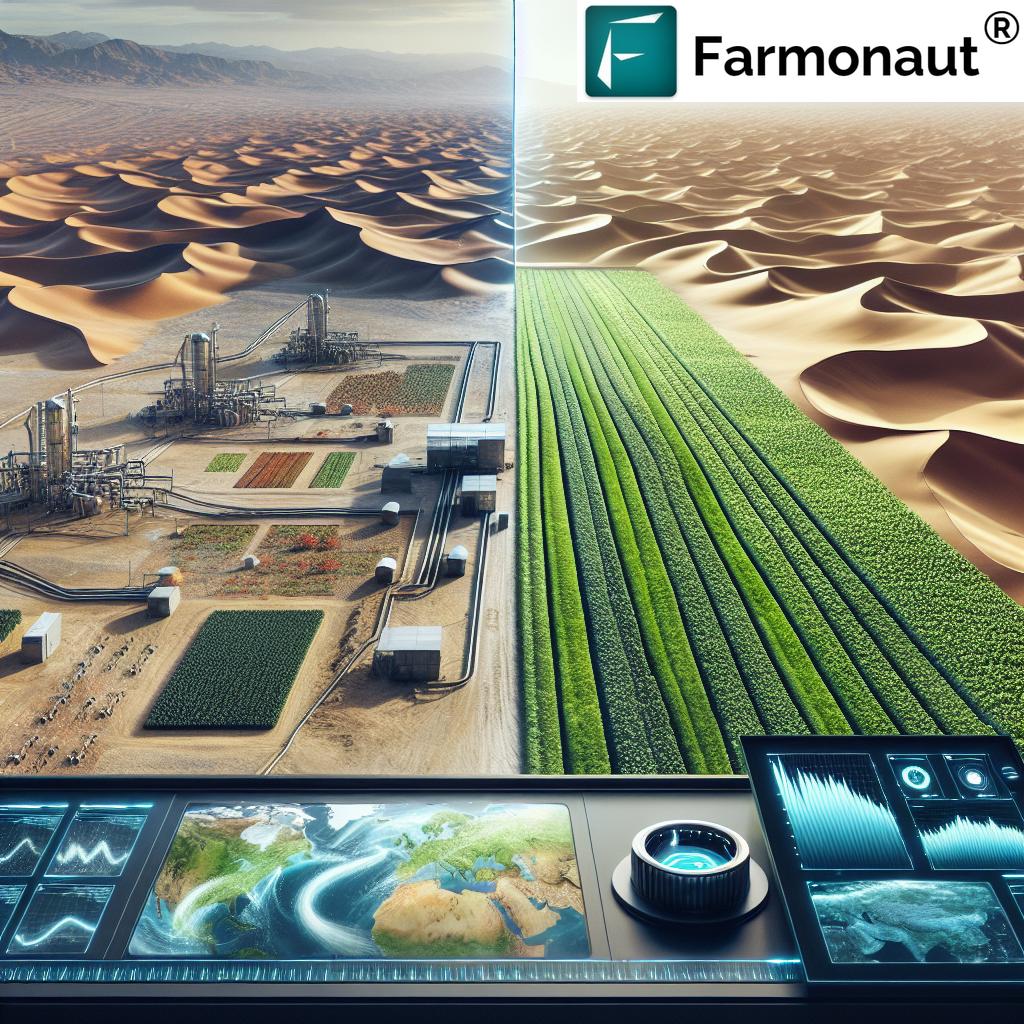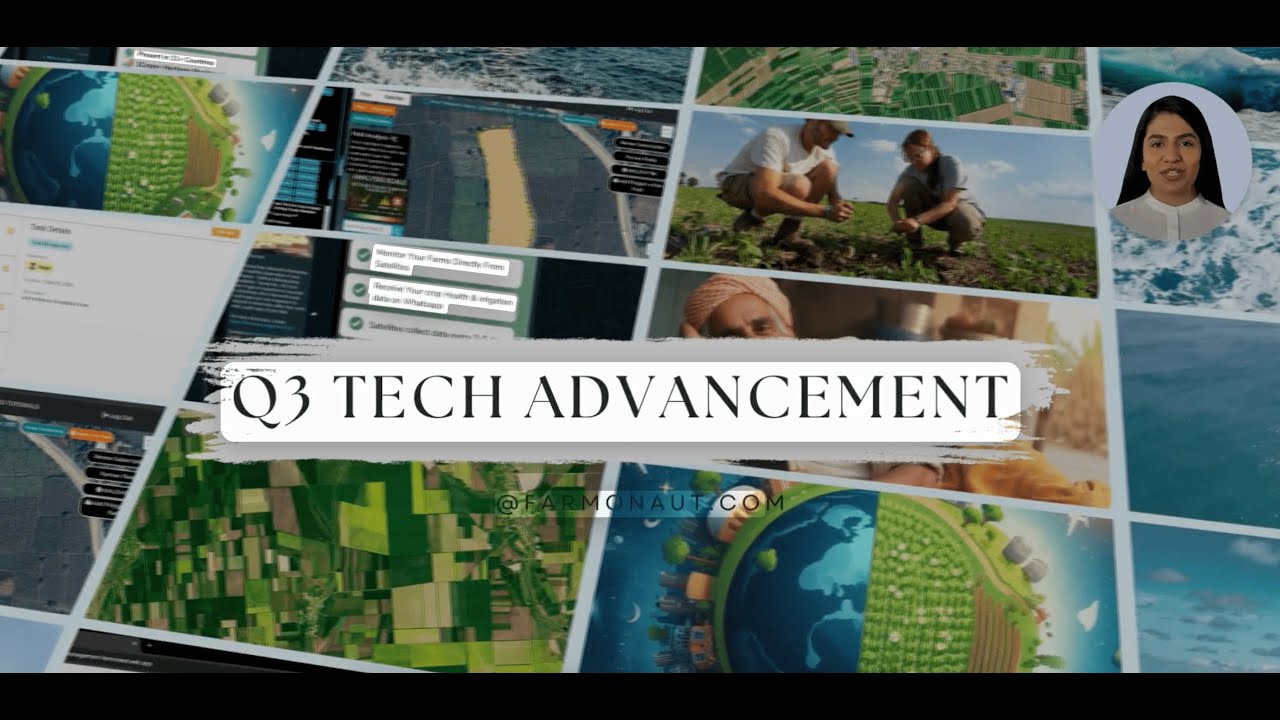Revolutionizing Desert Agriculture: Sustainable Water Conservation and Soil Health Innovations in the Middle East
“Liquid natural carbonate technology in desert agriculture can boost crop yields by up to 30% while reducing water usage.“
In the ever-evolving landscape of global agriculture, we find ourselves at the forefront of a revolution that promises to transform the way we cultivate in some of the world’s most challenging environments. As we delve into the remarkable advancements in sustainable land management and water conservation in agriculture, we’re witnessing a paradigm shift that’s not only reshaping the Middle East but also influencing practices in the United States and beyond.
At Farmonaut, we’re excited to share these groundbreaking developments with you. While our focus remains on providing cutting-edge satellite-based farm management solutions, we’re always keen to explore and discuss industry-wide innovations that complement our mission of making precision agriculture accessible to farmers worldwide.

The Desert Control Revolution: A Leap in Sustainable Agriculture
Desert Control, a pioneering company in sustainable land management technologies, has recently shared some exciting updates that are set to reshape the agricultural landscape. Their Q3 2024 webcast, held on November 15, 2024, unveiled significant strides in both market expansion and technological innovation, marking impressive financial milestones and project developments.
Let’s break down the key highlights:
- Market Expansion: Desert Control has significantly amplified its market presence, particularly with the deployment of its innovative Liquid Natural Carbonate (LNC) technology.
- Financial Growth: Compared to Q3 2023, the company has more than doubled its LNC deployment volume, revenue, and pipeline value.
- Future Projects: Plans are in motion for full LNC deployment across multiple golf courses and major agricultural expansions in the U.S. by 2025.
These developments align closely with our mission at Farmonaut to promote sustainable farming practices. While we focus on satellite-based solutions, it’s inspiring to see complementary technologies making waves in the industry.
Operational Achievements: From California to the Middle East
Desert Control’s operational achievements span various sectors and geographies, showcasing the versatility and effectiveness of their sustainable agriculture solutions:
- California Landscaping: Pilot programs reported irrigation savings exceeding 25%, with some clients achieving over 50% water conservation.
- Golf Course Innovation: A landmark contract with Berkeley Country Club for complete LNC deployment, valued at over NOK 6 million.
- Agricultural Success: A date farm in Arizona demonstrated nearly double the yield using LNC technology.
- Middle East Expansion: The company has begun generating licensing royalties from the Middle East, marking a significant milestone for scalable revenue streams.
These achievements underscore the global potential of sustainable agriculture technologies. At Farmonaut, we’re particularly intrigued by the water conservation aspects, as our satellite-based crop health monitoring system also aims to optimize irrigation efficiency.
R&D Partnerships: Driving Innovation in Soil Health
Desert Control’s research and development efforts have been bolstered by strategic partnerships, notably with Syngenta. These collaborations are showing promising results in enhancing soil health, crop yields, and water conservation. As a company dedicated to agricultural innovation, we at Farmonaut recognize the importance of such partnerships in driving the industry forward.
The company’s next-generation LNC production system is evolving rapidly, with plans to achieve a production capacity of 120,000 liters per hour. This advancement positions Desert Control for large-scale opportunities and highlights the potential for significant improvements in desert agriculture solutions.
“Sustainable water conservation methods in Middle Eastern agriculture have achieved impressive water savings of 40-60% in pilot projects.“
Financial Performance: A Testament to Sustainable Growth
Desert Control’s financial performance in the first nine months of 2024 has been nothing short of impressive:
- Record installations and LNC deployment
- Significant increase in revenue, totaling NOK 1.88 million (more than double from the previous year)
- Healthy cash position of NOK 75 million at the end of Q3
- Operations continue without interest-bearing debt
This financial stability and growth trajectory are encouraging signs for the sustainable agriculture sector as a whole. At Farmonaut, we understand the importance of financial health in driving innovation and expanding access to advanced agricultural technologies.

The Future of Desert Agriculture: A Sustainable Vision
Looking ahead, Desert Control aims to leverage its successful pilots to secure larger contracts while developing solutions that enhance soil health and water conservation on a global scale. The company anticipates that 2025 will be another landmark year, setting an optimistic trajectory for innovative approaches to ecological challenges.
This vision aligns well with our goals at Farmonaut. While we specialize in satellite-based farm management solutions, we recognize the importance of diverse approaches to sustainable agriculture. Our API and API Developer Docs are designed to complement and integrate with various agricultural technologies, fostering a more holistic approach to farm management.
Comparing Desert Agriculture Innovations
To better understand the impact of these new technologies, let’s take a closer look at how they compare in terms of water conservation, crop yield improvement, and implementation complexity:
| Innovation | Water Savings (%) | Crop Yield Increase (%) | Implementation Complexity (1-5 scale) |
|---|---|---|---|
| Liquid Natural Carbonate (LNC) Technology | 25-50% | 30-100% | 3 |
| Mobile LNC Production Systems | 20-40% | 20-50% | 4 |
| Satellite-Based Crop Monitoring (e.g., Farmonaut) | 15-30% | 10-25% | 2 |
| AI-Driven Irrigation Systems | 30-60% | 15-35% | 3 |
This comparison highlights the significant potential of these innovations in transforming desert agriculture. While each technology offers unique benefits, the combination of these solutions could lead to even more substantial improvements in water conservation and crop yields.
The Role of Agritech in Sustainable Desert Agriculture
As we explore these groundbreaking developments in desert agriculture, it’s crucial to understand the role that agritech plays in driving these innovations. At Farmonaut, we’re proud to be part of this technological revolution, offering solutions that complement and enhance sustainable farming practices.
Our satellite-based crop health monitoring system provides farmers with real-time insights into vegetation health, soil moisture levels, and other critical metrics. This data-driven approach aligns perfectly with the goals of water conservation and soil health improvement that are at the heart of desert agriculture innovations.
For those interested in exploring our solutions, we offer multiple ways to access our technology:
The Intersection of Technology and Sustainable Farming
The advancements we’re seeing in desert agriculture are a testament to the power of technology in addressing some of the most pressing challenges in modern farming. From liquid natural carbonate technology to satellite-based monitoring systems, these innovations are reshaping our approach to cultivating in harsh environments.
At Farmonaut, we believe that the future of agriculture lies in the intelligent integration of various technologies. Our platform, for instance, can work in tandem with irrigation systems and soil treatments to provide a comprehensive solution for farmers. By combining real-time satellite data with on-the-ground innovations like those developed by Desert Control, we can create a more resilient and productive agricultural ecosystem.
The Economic Impact of Agricultural Innovations
The financial implications of these advancements in desert agriculture are significant. As we’ve seen from Desert Control’s recent report, there’s a clear correlation between technological innovation and financial growth in the agricultural sector. This economic boost isn’t just beneficial for technology providers; it has far-reaching implications for farmers, local economies, and global food security.
Some key economic benefits include:
- Reduced water costs for farmers
- Increased crop yields leading to higher revenues
- New job opportunities in agritech and related fields
- Potential for exporting technology and expertise to other arid regions
These economic advantages underscore the importance of continued investment and research in sustainable agriculture technologies.
Scaling Sustainable Solutions: From Pilot Projects to Global Implementation
One of the most exciting aspects of these desert agriculture innovations is their potential for scalability. The success of pilot projects, like those conducted by Desert Control in California and the Middle East, paves the way for larger-scale implementations.
At Farmonaut, we understand the importance of scalability in agricultural solutions. Our platform is designed to serve a wide range of users, from individual farmers to large agribusinesses. This scalability is crucial for the widespread adoption of sustainable farming practices.
Key factors in scaling these solutions include:
- Adaptability to different climates and soil types
- Cost-effectiveness for farmers of all sizes
- Integration with existing farming practices and technologies
- Support from government policies and agricultural institutions
As these innovative technologies prove their worth in diverse settings, we anticipate seeing more widespread adoption across arid and semi-arid regions worldwide.
The Future of Farming: A Sustainable, Tech-Driven Vision
As we look to the future, it’s clear that the agricultural sector is on the cusp of a major transformation. The innovations we’re seeing in desert agriculture are just the beginning. We envision a future where farming is not only more productive but also more sustainable and resilient to environmental challenges.
At Farmonaut, we’re committed to being part of this future. Our ongoing development of satellite-based farm management solutions aligns perfectly with the broader trends in agritech. We believe that by combining various technologies – from soil treatments to satellite monitoring – we can create a more holistic approach to sustainable agriculture.
Key areas for future development include:
- Further integration of AI and machine learning in farm management
- Development of more drought-resistant crop varieties
- Expansion of precision agriculture techniques to smaller farms
- Increased focus on carbon sequestration in agriculture
As we continue to innovate and collaborate within the industry, the possibilities for sustainable, productive farming in even the most challenging environments seem limitless.
Farmonaut Subscriptions
FAQ: Desert Agriculture and Sustainable Farming
Q: What is Liquid Natural Carbonate (LNC) technology?
A: LNC is an innovative soil treatment that improves water retention and soil structure, leading to better crop yields and reduced water usage in desert agriculture.
Q: How does satellite-based crop monitoring contribute to sustainable farming?
A: Satellite monitoring provides real-time data on crop health, soil moisture, and other vital metrics, allowing farmers to make informed decisions about irrigation and resource management, ultimately leading to more sustainable practices.
Q: What are the main challenges in implementing these new technologies in desert agriculture?
A: Challenges include initial implementation costs, adapting technologies to specific local conditions, and training farmers in new farming methods.
Q: How do these innovations impact water conservation in agriculture?
A: Technologies like LNC and precision irrigation systems can significantly reduce water usage, with some projects reporting water savings of up to 60%.
Q: Can these desert agriculture solutions be applied to other types of farming environments?
A: Yes, many of these innovations can be adapted for use in various agricultural settings, particularly in areas facing water scarcity or soil quality issues.
Conclusion: A Greener Future for Desert Agriculture
As we’ve explored throughout this article, the future of desert agriculture is bright, driven by innovative technologies and a commitment to sustainability. From the groundbreaking work of companies like Desert Control to the satellite-based solutions offered by Farmonaut, the agricultural sector is embracing a new era of efficiency and environmental responsibility.
These advancements in sustainable land management and water conservation are not just transforming landscapes in the Middle East and the United States; they’re setting a new standard for global agriculture. As we face increasing challenges from climate change and resource scarcity, these innovations offer hope for a more sustainable and food-secure future.
At Farmonaut, we’re proud to be part of this agricultural revolution. Our commitment to making precision agriculture accessible to farmers worldwide aligns perfectly with the broader goals of sustainable farming. As we continue to develop and refine our satellite-based farm management solutions, we look forward to contributing to this exciting future of agriculture.
Together, through innovation, collaboration, and a shared commitment to sustainability, we can revolutionize desert agriculture and create a greener, more productive world for generations to come.




















